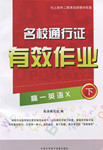题目内容
--- I forgot to do my homework. Don’t tell the teacher.
--- I won’t tell anybody, but do you think you can _______ it?
A. get away from B. break away from
C. get away with D. run away from
C

 名校通行证有效作业系列答案
名校通行证有效作业系列答案It was Molly’s job to hand her father his brown paper lunch bag each morning before he headed off to work.
One morning, in addition to his usual lunch bag, Molly handed him a second paper bag. This one was worn and held together with staples (订书钉) 。
“Why two bags?” her father asked. “The other is something else,” Molly answered. “What’s in it?” “Just some stuff. Take it with you.”
Not wanting to discuss the matter, he put both bags into his briefcase, kissed Molly and rushed off. At midday he opened Molly’s bag and took out the contents: two hair ribbons(丝带), three small stones, a plastic dinosaur, a tiny sea shell, a small doll, and 13 pennies… The busy father smiled, finished eating, and swept the desk clean into the wastebasket, Molly’s stuff included.
That evening, Molly ran up behind him as he read the paper. “Where’s my bag?” “What bag?” “The one I gave you this morning.” “I left it at the office. Why?” “I forgot to put this note in it,” she said. “And, besides, Daddy, the things in the sack are the things I really like — I thought you might like to play with them. You didn’t lose the bag, did you, Daddy?” “Oh, no,” he said, lying. “I just forgot to bring it home. I’ll bring it tomorrow.” While Molly hugged her father’s neck, he unfolded the note that read: “I love you, Daddy.” Molly had given him her treasures — all that a 7-year-old held dear.
Love in a paper bag, and he missed it — not only missed it, but had thrown it in the wastebasket. So back he went to the office. Just ahead of the night janitor(看门人), he picked up the wastebasket. He put the treasures inside and carried it home carefully. The bag didn’t look so good, but the stuff was all there and that’s what counted.
After dinner, he asked Molly to tell him about the stuff in the sack. It took a long time to tell. Everything had a story or a memory.
“Sometimes I think of all the great times in this sweet life,” he thought.
We should all remember that it’s not the destination that counts in life, but the journey. That journey with the people we love is all that really matters. It is such a simple truth but it is so easily forgotten.
【小题1】Why did Molly give her father a second bag?
| A.She didn’t want to keep the things in the bag. |
| B.She hoped those things would bring happiness to her father. |
| C.She wanted to remind her father of the stories behind the things. |
| D.She enjoyed playing with her father. |
| A.He kept it in the drawer. |
| B.He took it back home. |
| C.He threw it into the wastebasket. |
| D.He put it on his table. |
| A.regretful | B.surprised | C.sad | D.satisfied |
| A.An important journey | B.Two bags |
| C.Father and daughter | D.Love in a paper bag |
I had been so _________ with my work that I forgot to buy a gift for my daughter’s birthday, which I had promised to.
|
A.occupied |
B.devoted |
C.accompanied |
D.buried |